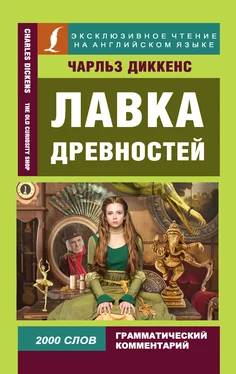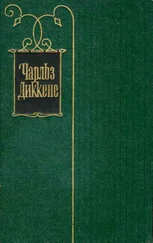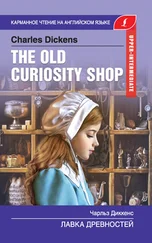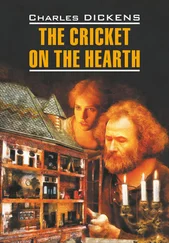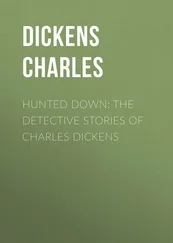He was sitting in his easy-chair one day, and Nell upon a stool beside him, when a man outside knocked.
“Yes,” the old man said without emotion, “it is Quilp. Quilp is master there. Come in, of course.”
And so he did.
“I’m glad to see you well again at last, neighbour,” said the dwarf, sitting down opposite to him. “You’re quite strong now?”
“Yes,” said the old man feebly, “yes.”
“I don’t want to hurry you, you know, neighbour,” said the dwarf, raising his voice; “but, as soon as you can find a place to live, the better.”
“Surely,” said the old man. “The better for everybody. I will, certainly, we shall not stay here.”
“You see,” pursued Quilp after a short pause, “I have sold the things. Today’s Tuesday. When will the things be moved? This afternoon?”
“What about Friday morning?” returned the old man.
“Very good,” said the dwarf. “So be it, neighbour.”
“Good,” returned the old man. “I shall remember it.”
Thursday arrived. In a small dull yard below his window, there was a tree green and flourishing enough, it threw a rippling shadow on the white wall. The old man sat watching the shadows, until the sun went down; and when it was night, and the moon was slowly rising, he still sat in the same spot.
He besought Nelly to forgive him.
“Forgive you what?” said Nell. “Oh grandfather, what should I forgive?”
“All that is past, all that has come upon you, Nell, all that was done,” returned the old man.
“Do not talk so,” said the child. “Pray do not. Let us speak of something else.”
“Yes, yes, we will,” he rejoined. “Hush! We will not stay here. We will go far away from here.”
“Yes, let us go,” said the child earnestly. “Let us leave this place, and never turn back or think of it again. Let us wander barefoot through the world, rather than linger here.”
“We will,” answered the old man, “we will travel afoot through the fields and woods, and by the side of rivers, and trust ourselves to God in the places where He dwells. You and I together, Nell.”
“We will be happy,” cried the child. “We never can be here.”
“No,” rejoined the old man. “Let us steal away tomorrow morning early and softly, that we may not be seen or heard. Poor Nell! Your cheek is pale, and your eyes are weeping; but you will be well again, and merry too, when we are far away. Tomorrow morning, dear, we’ll turn our faces from this scene of sorrow, and be as free and happy as the birds.”
And then, the old man clasped his hands above her head, and said that from that time forth they would wander up and down together.
The child’s heart beat high with hope and confidence. She had no thought of hunger, or cold, or thirst, or suffering. The old man had slept, for some hours, in his bed, and she was busily engaged in preparing for their flight. There were a few articles of clothing for herself to carry, and a few for him; old garments; and a staff to support his feeble steps. But this was not all her task; for now she must visit the old rooms for the last time.
She sat down at the window where she had spent so many evenings. There were some trifles in her room that she would like to take away; but that was impossible.
The old man woke up. He wanted to leave the house immediately, and was soon ready. The child then took him by the hand, and they trod lightly and cautiously down the stairs. At last, they reached the passage on the ground-floor, where the snoring of Mr. Quilp and his legal friend sounded more terrible in their ears than the roars of lions.
They opened the door without noise, and passing into the street, stood still.
“Which way?” said the child.
The old man looked, irresolutely and helplessly, first at her, then to the right and left, then at her again, and shook his head. The child put her hand in his, and led him gently away.
Forth from the city went the two poor adventurers, wandering they knew not whither.
Dick Swiveller entered the shop and saw Daniel Quilp.
“You came for some purpose, I suppose,” said Quilp. “What is it you want?”
“I want to know how the old gentleman is,” rejoined Mr. Swiveller, “and to see Nell. I’m a friend of the family, sir, at least I’m the friend of one of the family, and that’s the same thing.”
“You’d better walk in then,” said the dwarf. “Go on, sir, go on.”
“You seem to make yourself at home here,” said Dick, who was unacquainted with Mr. Quilp’s authority.
“I am at home, young gentleman,” returned the dwarf.
Dick was pondering what these words might mean, and still more what the presence of Mr. Brass might mean, when Mrs. Quilp came downstairs, declaring that the rooms above were empty.
“Empty, you fool!” said the dwarf.
“I have been into every room, Quilp,” answered his trembling wife, “and there’s not a soul in any of them.”
Quilp turned to Mr. Brass.
“Indeed,” he said, “we knew that they’d go away today, but not that they’d go so early, or so quietly. But they have their reasons, they have their reasons.”
“Where did they go?” said the wondering Dick.
Swiveller was utterly aghast. The old man and all the money melted away.
“Well,” said Dick, “I suppose it’s of no use my staying here.”
“Not the least in the world,” rejoined the dwarf.
By this time, certain vans had arrived for the conveyance of the goods. The dwarf observed, that a boy was prying in at the outer door. It was Kit, and Mr. Quilp hailed him by his name.
“Come here, you sir,” said the dwarf. “Well, so your old master and young mistress have gone?“
“Where?” rejoined Kit, looking round.
“Do you mean to say you don’t know where?” answered Quilp sharply. “Where have they gone, eh?”
“I don’t know,” said Kit.
“Oh!” said the dwarf after a little consideration. “Then, I think they’ll come to you.”
“Do you think they will?” cried Kit eagerly.
“Why not?” returned the dwarf. “And when they do, let me know; do you hear? Let me know, and I’ll give you something. I want to do them a kindness, and I can’t do them a kindness unless I know where they are. You hear what I say?”
The child trembled with a mingled sensation of hope and fear. The town was glad with morning light; the flowers that sleep by night, opened their gentle eyes and turned them to the day. The two pilgrims, often pressing each other’s hands, or exchanging a smile or cheerful look, pursued their way in silence. They came upon a straggling neighbourhood. At length the streets becoming more straggling yet, dwindled and dwindled away, until there were only small garden patches bordering the road. Then came some houses, one by one, of goodly size with lawns, some even with a lodge where dwelt a porter and his wife. Then, came a turnpike; then fields again with trees and haystacks; then, a hill. In a pleasant field, the old man and his little guide sat down to rest. Here they made their frugal breakfast.
“Dear grandfather,” said Nelly, “this place is very pretty, and I feel as if laid down on this grass all the cares and troubles we brought with us; never to take them up again.”
“No never to return, never to return” replied the old man, waving his hand towards the city. “You and I are free of it now, Nell.”
“Are you tired?” said the child, “are you sure you don’t feel ill from this long walk?”
“I shall never feel ill again, now that we are once away,” was his reply. “Let us go, Nell. We must be further away a long, long way further. We are too near to stop [35] we are too near to stop – нам ещё рано останавливаться
, and be at rest. Come!”
Читать дальше
